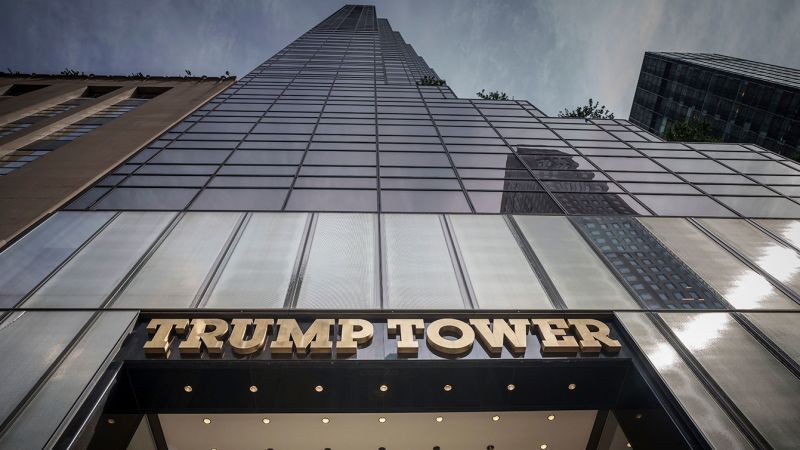A version of this story appears in CNN’s What Matters newsletter. To get it in your inbox, sign up for free here.
A New York judge’s finding that former President Donald Trump, his adult sons, his business associates and his eponymous company for years committed fraud could spell the end of Trump’s business career in his former home state.
“The equivalent of the corporate death penalty for the Trump Organization in New York state,” is how the Trump critic and attorney George Conway described the ruling during an appearance Tuesday on CNN. It was a much-repeated phrase after the surprise ruling.
New York Judge Arthur Engoron canceled the Trump Organization’s business certification and ordered that a receiver be appointed to dissolve Trump’s properties. A trial is supposed to get under way next week at which Engoron could decide to “disgorge” Trump of profits amassed by inflating his wealth.
Whether Trump will actually lose control over iconic properties like Trump Tower or pay hundreds of millions – New York Attorney General Letitia James, who brought the case, wants $250 million – remains to be seen.
That the decisive “summary judgment” came before the trial portion of the lawsuit even gets under way was an unexpected development that caught attorneys off guard at a pretrial hearing Wednesday.
“Don’t take this the wrong way, but what in the court’s mind does this trial now look like? Like what are the issues?” Trump attorney Christopher Kise asked during the hearing Wednesday.
Engoron said the court could hear from 188 witnesses during the trial. All of the parties are supposed to, within 10 days of his order, recommend names of potential, independent receivers to oversee the dissolution of overinflated Trump assets.
Trump was quick to allege partisanship, noting in a social media post that Engoron is a Democrat.
CNN’s report noted that nobody currently understands how this process will play out.
“Questions remain as to how the receiver would dissolve the properties, if the ruling would impact properties located outside of New York state, including Mar-a-Lago, and if the Trumps could transfer the New York-based assets into a new company located out of state,” write CNN’s Kara Scannell and Lauren del Valle.
Certainly there will be appeals of this finding by Trump’s attorneys, five of whom Engoron fined $7,500 each for making frivolous arguments.
Engoron agreed with James that Trump and his businesses overvalued assets by hundreds of millions of dollars, and the judge said the financial world Trump portrayed to lenders was a “fantasy world.”
Among the overinflated properties:
- Mar-a-Lago in Florida – $409 million – $585 million overvalued.
- Trump’s Trump Tower penthouse in New York – $114 million – $207 million overvalued.
- Seven Springs Estate in New York – $231 million – $261 million overvalued.
These overvaluation figures are getting some scrutiny from Trump’s children and in conservative media, particularly in the case of Mar-a-Lago. The judge used an $18 million to about $28 million assessment for the actual value of the massive compound, which could fetch hundreds of millions of dollars if sold as a home.
However, the judge noted that it is not a home and in fact Trump agreed to forever treat the property as a social club and not convert it to residences.
The actual assessed values cited by the judge during the years in question are official “taxable value” assessments calculated by the Palm Beach County assessor. Those are the figures on which Trump’s been paying property tax, not the hundreds of millions of dollars he argues the property is worth in order to obtain loans.
This is a longstanding pattern of Trump’s – inflating wealth to serve his purpose in public but trying to pay taxes on far lower figures behind the scenes.
In another notable instance, Trump claimed the penthouse at Trump Tower, in which he lived for many years, was 30,000 square feet, allowing him to inflate its worth. It turns out the property is a little less than 11,000 square feet.
In all, the New York attorney general’s office argues Trump drastically overvalued his assets for years. The most overvalued year was in 2014, when he inflated his net worth by $2.2 billion.
He and others used the inflated self-worth to get better terms on loans and insurance policies.
We know that Trump has continued to secure loans on properties even as it has become more difficult for him to find relationships with major banks. In 2022, for instance, he refinanced a mortgage on Trump Tower with a $100 million loan through a California bank run by a supporter.
For years, Trump’s largest loan relationship was with Deutsche Bank, to which he owed more than $300 million when he became president, and which has lent him more than $2 billion over the course of decades, according to The New York Times.
CNN reported in 2021 that Deutsche Bank is no longer doing business with Trump.
The investigative reporter David Cay Johnston explained on “CNN This Morning” how the judge could go further if he seeks to disgorge profits Trump amassed based on fraudulent valuations.
He drew an analogy to a person stealing $100 to place a bet at the racetrack and winning $1,000. Disgorgement in this case would mean authorities can try to recoup not only the stolen $100, but also the $900 in profit.
Johnston agreed with the “corporate death penalty” analogy to Trump’s New York business career.
“Donald Trump, as of right now, is no longer a businessman in New York,” he said.
Conway pointed out that the 102-year-old statute invoked by the judge – the Martin Act – does not require proof of fraudulent intent by the business or its officers or proof that the false numbers are actually relied on.
“It’s enough that the numbers be false,” Conway said.
There’s no dispute that the numbers Trump used to obtain loans were incorrect, although his lawyers argued a disclaimer on the disclosure forms meant nobody should have believed them in the first place.
Trump, during testimony in a deposition for this suit, said his financial disclosures were both “meaningless” documents and a “good faith effort.”
His lawyers have also argued that Trump never missed an interest payment and that Deutsche Bank made more than $75 million in interest from its loans connected to him. Another lender, Ladder Capital, made $40 million in interest, according to Trump’s lawyers.
The former Trump attorney Michael Cohen, who pleaded guilty and served jail time for things he says he did on Trump’s behalf, told Congress in 2019 that Trump inflated his wealth in 2014 – the year James alleges Trump inflated his wealth by more than $2.2 billion – as part of an effort to obtain financing from Deutsche Bank to buy the Buffalo Bills.
Responding to Engoron’s finding during an appearance on CNN on Tuesday, Cohen said the only true way to get to Trump is through his business.
“Once you start hitting that bank book, that’s what really gets to him,” Cohen said.
There are plenty of trials that might ultimately get to Trump in other ways. This legal drama that undercuts his businessman brand will unfold alongside his multiple criminal cases regarding his conduct before and after he left the White House and the civil suits in which he has already been found liable for sexual abuse and defamation of a New York writer.
Read the full article here





